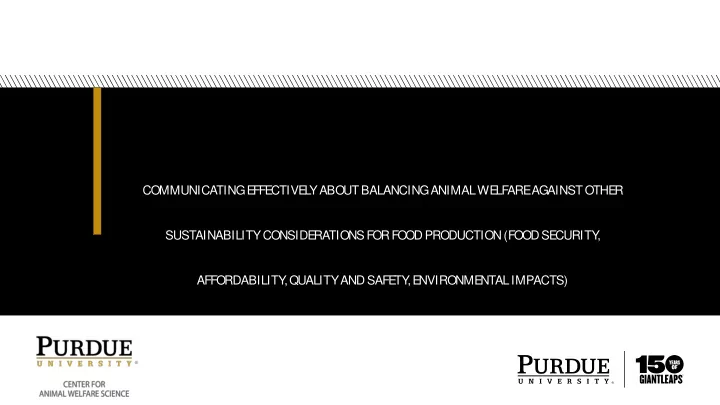

COMMUNICATING E FFE CTIVE L Y ABOUT BALANCING ANIMAL WE LF ARE AGAINST OTHE R SUSTAINABILITY CONSIDE RATIONS FOR FOOD PRODUCTION (FOOD SE CURITY , AFFORDABILITY , QUALITY AND SAFE TY , E NVIRONME NTAL IMPACTS)
What does success look like on this topic? Identify the main issue/ problem this communication will address Financial sustainability at farm level – Finding ways to ensure affordable costs of animal welfare standards Promoting science-based changes – Incorporating consumer concerns
Who are the target audiences for communications? Who should be communicated with on this topic and what is the relevance of this topic to the audiences you have identified? Why might they care about it? Consider traditional stakeholders (who are they?) Consider non-traditional stakeholder audiences we might overlook who should also be targeted Producers Consumers Citizens Policy-makers – Importance of double consciousness
How can we more effectively engage the target audiences? What are the proposed solutions to the problem and how might we communicate them to traditional audiences (producers)? Research on contentious issues – Multidisciplinary research (animal welfare & economics) Results "translated"/disseminated to producers – Determination of actual welfare concerns – Messaging effectiveness • Quick, easy to understand, science-based (via newspapers, magazines, extension, farmer networks) • Monitor implementation of recommended changes, ask for feedback to measure attitude shifts – Need-based grants – Government funding
How can we more effectively engage the target audiences? What are the proposed solutions to the problem and how might we communicate them to non-traditional audiences (consumers, retailers, policy-makers, etc.)? Consider where these groups might go for information. What would you tell them? What media and other means of communications might you use? Who would be the most credible messenger? How would you know if your message was effective? Effective messaging – Technical communication professionals • Policy-makers – Social media, ago-tourism, labels • Consumers
What benefits does this solution have specifically for your audience? ? What benefits does this solution have specifically for the problem-solvers and the target audiences? Producers' benefits – Support network • Better producer AND consumer understanding • Increased support from consumers/citizens – Cost efficiency • Ability to more feasibly meet animal welfare standards Increased animal welfare Inclusion – All stakeholders participating in process
Recommend
More recommend